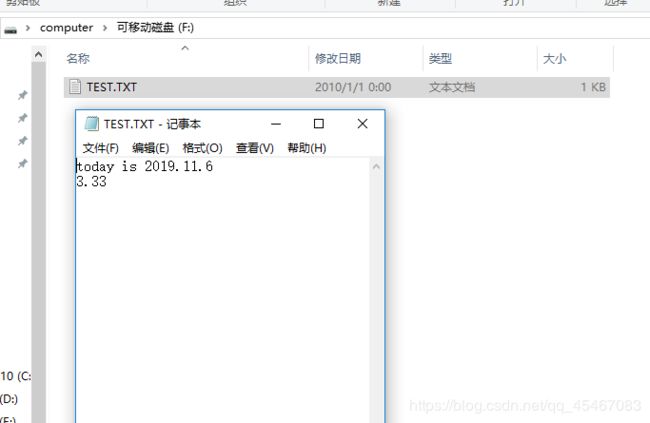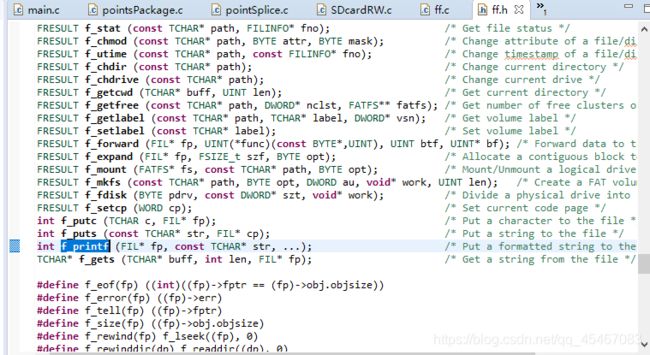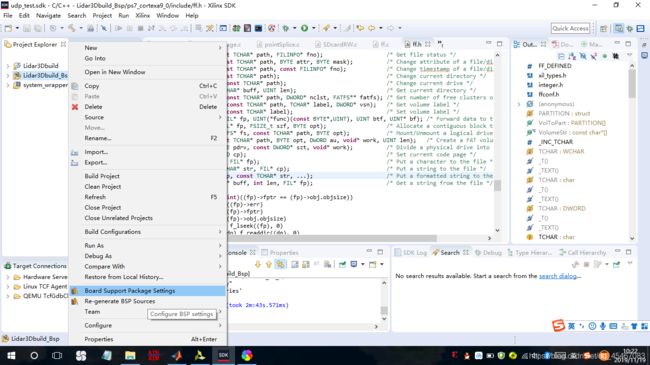- zynq设计学习笔记2——GPIO之MIO控制LED实验
墨漓_lyl
FPGA之zynq设计学习笔记嵌入式fpga
vivado软件操作步骤与学习笔记1——helloworld差不多,这里不再过多赘述,不同点是在zynq的设置中添加上GPIO的设置即可。进入SDK软件后,程序如下:#include"stdio.h"#include"xparameters.h"#include"xgpiops.h"#include"sleep.h"#defineGPIO_DEVICE_IDXPAR_XGPIOPS_0_DEVIC
- FPGA时序约束的概念和意义
学习永无止境@
FPGA设计fpgafpga开发开发语言
设计人员通过GUI输入时序约束,或者手动输入时序约束的方式告诉Vivado工具关于时钟或者IO接口的时序信息,用于协助Vivado工具在布局布线时尽可能的满足设计人员的时序要求,最大程度的保证Vivado工具每次生成的bit文件都具备良好的稳定性和适应性。
- 基于FPGA的DDS连续FFT 仿真验证
toonyhe
FPGA开发fpga开发DDSFFTIFFT
基于FPGA的DDS连续FFT仿真验证1摘要本文聚焦AMDLogiCOREIPFastFourierTransform(FFT)核心,深入剖析其在FPGA设计中的应用。该FFT核心基于Cooley-Tukey算法,具备丰富特性,如支持多种数据精度、算术类型及灵活的运行时配置。文中详细介绍了其架构选项、端口设计、理论运算原理,以及在不同场景下的动态范围特性。同时,结合VivadoDesignSuit
- Vitis 2024.1 无法正常编译custom ip的bug(因为Makefile里的wildcard)
Αλήθεια
bugfpgafpga开发arm
现象:如果在vivado中,添加了自己的customIP,比如AXI4IP,那么在Vitis(2024.1)编译导出的原本的.xsa的时候,会构建build失败。报错代码是:"Compilingblank_test_ip..."microblaze-xilinx-elf-gcc.exe:warning:(ildcard:linkerinputfileunusedbecauselinkingnotd
- 【FPGA教程案例31】通信案例1——基于FPGA的ASK调制信号产生
fpga和matlab
★教程2:fpga入门100例fpga开发FPGA教程ASK调制verilog
FPGA教程目录MATLAB教程目录---------------------------------------------------------------------------------------目录1.软件版本2.ASK调制原理3.ASK调制过程的FPGA实现4.操作步骤与仿真结论5.参考文献1.软件版本vivado2019.22.ASK调制原理幅度键控(Amplitude-Shi
- ZYNQ-7000 平台LwIP RAW Socket 模式下 TCP速率测试(Jperf)
WILLFr
tcp/ip网络服务器
在ZYNQ-7000平台下,使用Jperf测试LwIPRAWSocket模式下的TCP速率,工程代码适配到Vivado2018.2SDK版本,并在zynq-7000平台验证测试。LwIPRAWsocket模式下,TCP速率大于900Mbps,Jperf测试结果如下:工程文件:https://download.csdn.net/download/csdn6403/90482672?spm=1011.
- set_clock_groups
jh你好
硬件工程
一、命令参数与工具处理逻辑核心参数定义参数定义工具行为工具兼容性-asynchronous完全异步时钟组,无任何相位或频率关系(如独立晶振、不同时钟树)工具完全禁用组间路径的时序分析,但需用户自行处理跨时钟域(CDC)问题XilinxVivado、IntelQuartus、Gowin(等效参数-Exclusive)-logically_exclusive逻辑互斥时钟组,同一时刻仅一个有效(如MUX
- [Vivado] IP核学习之Block Memory Generator
奕天者
FPGA学习学习fpga开发ip
具体参考Xilinx文档,pg058-blk-mem-genVersion8.4。一、BlockMemoryGenerator有什么用?BlockMemoryGenerator是Vivado中的IP核,即块存储器生成器。BlockMemoryGeneratorIP核是一种高级内存构造器,可使用Xilinxfpga中的嵌入式块RAM资源来生成面积和性能优化的内存空间。BlockMemoryGener
- FPGA 学习笔记:Vivado 2020.2 MicroBlaze MIG 测试 DDR3 篇二
zhangsz_sh
FPGA开发技术fpga开发学习
前言因为FPGADDR3测试的工程搭建步骤比较的多,所以分成几篇来写,这样利于把复杂的事情拆分,利于理解与实际的操作上一篇搭建了初步的HelloWorld工程,还没写什么代码或者改什么配置,所以FPGA开发,并不是上来就写VerilogHDL,而是要把更多的时间用在:目标是什么?DDR3测试,正常DDR3能否当RAM一样使用清楚要做什么,这里通过搭建嵌入式软核处理器的方式,快速验证实现与验证:搭建
- 【vivado】debug相关时钟及其约束关系
liuchj04
XilinxSoCFPGAfpga开发
一、前言在xilinxfpga的degug过程中,经常出现由于时钟不对而导致的观测波形失败,要想能够解决这些问题需要了解其debug的组成环境以及之间的数据流。本文主要介绍debug过程中需要的时钟及各时钟之间的关系。二、debug相关时钟Vivado硬件管理器使用JTAG接口与VivadoDebug内核进行通信,DebugHub在FPGA器件的JTAG边界扫描(BSCAN)接口和VivadoDe
- 听说Zynq-手把手教你自定义ip核并调用
不只会拍照的程序猿
听说ZYNQ嵌入式eclipseubuntufpgaverilog
概述小编最近在研究Zynq,因为对其相对陌生,在探索过程中也遇到了不少坑,这里将如何创建IP核并调用的方法步骤总结记录,以免日后忘记。注意★环境:Vivado2018.2。开发板:digilent(迪芝伦)公司的ZYBO创建IP核创建工程1.打开vivado软件,选择CreateProject创建项目。2.输入工程名和路径,勾选createprojectsubdirectory,为你自动在目录下创
- Vivado 约束文件XDC使用经验总结
宁静致远dream
FPGA不积跬步
1.1Vivado约束文件XDC使用经验总结1.1.1本节目录1)本节目录;2)本节引言;3)FPGA简介;4)Vivado约束文件XDC使用经验总结;5)结束语。1.1.2本节引言“不积跬步,无以至千里;不积小流,无以成江海。就是说:不积累一步半步的行程,就没有办法达到千里之远;不积累细小的流水,就没有办法汇成江河大海。1.1.3FPGA简介FPGA(FieldProgrammableGateA
- Linux下VCS与Verdi联合仿真(Verilog与VHDL混仿)
超能力MAX
fpga开发
1.介绍本篇简单介绍一下如何通过VCS与Verdi实现混合仿真,在学习过程中也遇到了很多头疼的问题,因此通过一些例子简要总结一下,当然,也希望对各位小伙伴有所帮助。很多公司ASIC设计所使用的还是更加专业的EDA软件,即Synopsys下的VCS、Verdi这种(Vivado大多针对于自家FPGA),VCS编译速度极快,仿真效率高,Verdi支持信号追溯、无缝增加信号波形等功能。2.使用环境:Li
- vivado实现FFT和IFFT信号处理
寒听雪落
信号处理_通信原理FPGA专栏_verilog信号处理算法
一,FFT的物理意义FFT是离散傅立叶变换的快速算法,可以将一个信号变换到频域。有些信号在时域上是很难看出什么特征的,但是如果变换到频域之后,就很容易看出特征了。这就是很多信号分析采用FFT变换的原因。另外在频谱分析方面,FFT可以将一个信号的频谱提取出来。一个模拟信号,经过ADC采样(采样频率要大于信号频率的两倍)之后,就变成了数字信号。采样得到的数字信号,就可以做FFT变换了。N个采样点,经过
- 时钟结构设计
cckkppll
fpga开发
时钟结构设计现在已经清楚地说明时钟决策的主要考虑因素,下面将介绍如何为设计提供需要的时钟。推断无需用户干预,Vivado综合工具就可以自动为所有时钟结构设定全局缓存(BUFG),直到架构允许的最大数量(除非用综合工具另行设定或加以控制)。如前文所述,BUFG能够提供满足大多数时钟需求的、受控良好的低偏差网络。除非器件上的BUFG数量或功能无法满足设计的时钟要求,无需另行干预。但是如果对时钟结构施加
- 常用软件安装包
sinat_39901027
edaic
Vivadovivado2022.2链接:https://pan.baidu.com/s/1ddVXKjxPZ5OL4gPSKMzwLg提取码:wmwkvivado2021.2链接:链接:https://pan.baidu.com/s/1EcrkcZzTe6v9LRnc5Fp0bg提取码:9tf8vivado2020.3链接:https://pan.baidu.com/s/1gFcHPX1cOnj
- vivado CLOCK_DELAY_GROUP、CLOCK_LOW_FANOUT
cckkppll
fpga开发
CLOCK_DELAY_GROUPLAY_GROUP属性标识具有相同MMCM的相关时钟,PLL、GT源或公共驱动器,应在放置和布线过程中进行平衡减少时钟之间的定时路径上的时钟偏斜。提示:时钟匹配(通过Clock_DELAY_GROUP属性)用于相同的MMCM、PLL或GT源。体系结构支持UltraScale、UltraScale+和VersalACAP体系结构。适用对象•直接连接到全局时钟输出的时
- FPGA实现光纤通信(3)——光纤8b/10b编码数据回环
得之坦然,失之淡然。
FPGA学习笔记fpga开发开源
前言光纤通信属于高速串行通信,具有较高的数据传输速率,通常用于服务器以及通信设备之间用于高速数据交换,对于xilinx7系列的FPGA,内部具有集成的高速接口用于实现光纤通信。本次就来实现8b/10b编码数据回环。测试环境:vivado版本:2020.02FPGA芯片:XC7K70T测试说明:进行光纤8B/10B编码数据回环测试8B/10B编码简介8b/10b编码是由IBM公司的Widmer和Fr
- FPGA入门学习之Vivado-数码管驱动设计实验
ZdqDeveloper
fpga开发学习FPGA
在本篇文章中,我们将介绍如何使用Vivado软件进行FPGA的数码管驱动设计实验。数码管是一种常见的输出设备,用于显示数字或字符等信息。通过本实验,您将学习如何使用FPGA来控制数码管的显示,并编写相应的Verilog代码。实验准备:Vivado软件的安装和配置。FPGA开发板(如Xilinx的Basys3)。实验步骤:步骤1:创建新工程打开Vivado软件,并选择"CreateProject"来
- 《基于FPGA的Cortex-M3软核基本SOC设计及外设开发详解》
HWxuYnO
fpga开发程序人生
基于FPGA的Cortex-M3软核基本SOC设计实现基于FPGA的Cortex-M3软核基本SOC,系统外设包括GPIO和UART串口。开发基于vivado2019.2和vitis,理论上可适用于任何版本的vivado,并且附带本人编写的详细开发文档,能够快速完成工程的移植。在该工程基础上可进一步开发更多的功能。ID:42100675319624107小小读者ok基于FPGA的Cortex-M3
- FPGA 时钟树缓存布局布线
cckkppll
fpga开发
时钟树缓存布局布线在以下阶段,Vivado布局器确定MMCM/PLL,全局时钟缓存和时钟根的位置,同时遵守物理XDC约束:1.I/O和时钟布局布局器根据连接规则和用户约束布局I/O缓存和MMCM/PLL。布局器将时钟缓存分配给时钟区域,但不分配给单个site位置,除非使用LOC属性进行约束。只有仅驱动非时钟负载的时钟缓存可以基于它们的驱动器和负载的布局移动到该流程中稍后的不同时钟区域。在此阶段的任
- vivado生成ltx文件命令_实验室自研工具Vivado Batch Mode Tool介绍!
电动星球蟹老板
vivado生成ltx文件命令
这里从两个方面分别进行说明,为什么要使用Vivado的Batchmode。1、流程操作效率我所谓的流程操作效率,是指在使用Vivado时,通过键盘输入、鼠标点击以及进行等待等实际外部操作的效率。例如我需要打开一个Vivado工程,并进行Synthesis,那么在GUI下是这样的流程操作:点击打开VivadoGUI并等待----用Vivado点击打开对应的.xpr文件并等待----点击runSynt
- Verilog中阻塞赋值和非阻塞赋值的区别?
张小侃
数字IC知识fpga硬件
阻塞赋值“=”对应组合逻辑电路赋值(无存储功能,立即赋值),并且会阻塞后面的赋值操作,非阻塞赋值“<=”对应时序逻辑电路赋值(有存储功能),所有非阻塞赋值操作在同一时刻进行赋值。下面分别通过vivado综合不同情况赋值的代码。第一种:在时序逻辑电路中使用阻塞赋值,通过综合后的电路可以看出非阻塞赋值综合出来的电路时立即执行赋值操作,和组合逻辑电路特性一致,无缓存功能,out_o直接被优化掉了。alw
- xilinx vivado PULLMODE 设置思路
坚持每天写程序
fpga开发
1.xilinx引脚分类XilinxIO的分类:以XC7A100TFGG484为例,其引脚分类如下:1.UserIO(用户IO):用户使用的普通IO1.1专用(Dedicated)IO:命名为IO_LXXY_#、IO_XX_#的引脚,有固定的特定用途,多为底层特定功能的直接实现,如差分对信号、关键控制信号等,不能随意变更。1.2多功能(Multi-Function)IO:命名为IO_LXXY_ZZ
- FPGA随记——赛灵思OOC功能
一口一口吃成大V
FPGA随记fpga开发
在这里,我们简要介绍一下Vivado的OOC(Out-of-Context)综合的概念。对于顶层设计,Vivado使用自顶向下的全局(Global)综合方式,将顶层之下的所有逻辑模块都进行综合,但是设置为OOC方式的模块除外,它们独立于顶层设计而单独综合。通常,在整个设计周期中,顶层设计会被多次修改并综合。但有些子模块在创建完毕之后不会因为顶层设计的修改而被修改,如IP,它们被设置为OOC综合方式
- zybo上运行linux,Zybo开发板linux作业系统移植
周行文
zybo上运行linux
文章主要介紹zyboboard上linux作业系统移植过程。分别介绍了开发环境搭建、U-boot编译、linux内核编译、busybox制作等流程及注意事项。文章使用的开发板是zynq7000系列的zyboboard。Vivado版本是2015.1.主机系统是Debian9.1.开发环境搭建工欲善其事必先利其器,做开发前搭建好编译环境是重要的一步,这些步骤大体上都相同,然而对于不同的系统平台、硬件
- 用VCS直接仿真vivado工程
啊节奏不对
vcs仿真fpga开发risc-v嵌入式硬件
用VCS直接仿真vivado工程前言编译vcs仿真库simulation设置RunSimulation写Makefile执行脚本,运行vcs仿真前言在日常搬砖过程中,在ICdesign进行fpga原型验证时,在上fpga测试之前,往往需要对vivado工程进行仿真,而vivado工程中可能存在较多的xilinxip或者blockdesign,直接使用vivado仿真,速度难以接收。如果使用vcs进
- Xilinx Vivado的RTL分析(RTL analysis)、综合(synthesis)和实现
2401_84185145
程序员fpga开发
理论上,FPGA从编程到下载实现预期功能的过程最少仅需要上述7个步骤中的4、5、6和7,即RTL分析、综合、实现和下载。其中的RTL分析、综合、实现的具体含义和区别又是什么?2、RTL分析(RTLanalysis)一般来讲,通常的设计输入都是Verilog、VHDL或者SystemVerilog等硬件描述语言HDL编写的文件,RTL分析这一步就是将HDL语言转化成逻辑电路图的过程。比如HDL语言描
- ARM/Linux嵌入式面经(三二):百度
TrustZone_Hcoco
ARM/Linux嵌入式面试arm开发dubbo芯片嵌入式硬件单片机
文章目录RTOS了解吗,展开讲一下对RTOS的线程和任务管理相关的有了解吗RTOS的线程和任务管理相关了解追问有深度的技术问题及答案vivado这个硬件平台怎么用的Vivado硬件平台使用了解追问有深度的技术问题及答案项目系统架构、配置是怎样的项目系统架构与配置系统架构配置追问有深度的技术问题及答案遇到的难点,怎么解决的?遇到的难点及解决方法追问有深度的技术问题及答案Linux上的异步IO了解过吗
- USER_CROSSING_SLR
cckkppll
fpga开发
在堆叠硅互连(SSI)设备上放置设计元素时,您可以使用要管理的USER_SLR_ASSIGNMENT、USER_CROSSING_SLR和USER_SLL_REG属性逻辑分区和Vivado放置工具的行为。SSI设备由以下部分组成多个超逻辑区域(SLR),由称为超长线的插入器连接连接连接起来(SLL)。有关在单反相机中放置和布线的更多信息,请参阅中的此链接Vivado设计套件的超快设计方法指南(UG
- 深入浅出Java Annotation(元注解和自定义注解)
Josh_Persistence
Java Annotation元注解自定义注解
一、基本概述
Annontation是Java5开始引入的新特征。中文名称一般叫注解。它提供了一种安全的类似注释的机制,用来将任何的信息或元数据(metadata)与程序元素(类、方法、成员变量等)进行关联。
更通俗的意思是为程序的元素(类、方法、成员变量)加上更直观更明了的说明,这些说明信息是与程序的业务逻辑无关,并且是供指定的工具或
- mysql优化特定类型的查询
annan211
java工作mysql
本节所介绍的查询优化的技巧都是和特定版本相关的,所以对于未来mysql的版本未必适用。
1 优化count查询
对于count这个函数的网上的大部分资料都是错误的或者是理解的都是一知半解的。在做优化之前我们先来看看
真正的count()函数的作用到底是什么。
count()是一个特殊的函数,有两种非常不同的作用,他可以统计某个列值的数量,也可以统计行数。
在统
- MAC下安装多版本JDK和切换几种方式
棋子chessman
jdk
环境:
MAC AIR,OS X 10.10,64位
历史:
过去 Mac 上的 Java 都是由 Apple 自己提供,只支持到 Java 6,并且OS X 10.7 开始系统并不自带(而是可选安装)(原自带的是1.6)。
后来 Apple 加入 OpenJDK 继续支持 Java 6,而 Java 7 将由 Oracle 负责提供。
在终端中输入jav
- javaScript (1)
Array_06
JavaScriptjava浏览器
JavaScript
1、运算符
运算符就是完成操作的一系列符号,它有七类: 赋值运算符(=,+=,-=,*=,/=,%=,<<=,>>=,|=,&=)、算术运算符(+,-,*,/,++,--,%)、比较运算符(>,<,<=,>=,==,===,!=,!==)、逻辑运算符(||,&&,!)、条件运算(?:)、位
- 国内顶级代码分享网站
袁潇含
javajdkoracle.netPHP
现在国内很多开源网站感觉都是为了利益而做的
当然利益是肯定的,否则谁也不会免费的去做网站
&
- Elasticsearch、MongoDB和Hadoop比较
随意而生
mongodbhadoop搜索引擎
IT界在过去几年中出现了一个有趣的现象。很多新的技术出现并立即拥抱了“大数据”。稍微老一点的技术也会将大数据添进自己的特性,避免落大部队太远,我们看到了不同技术之间的边际的模糊化。假如你有诸如Elasticsearch或者Solr这样的搜索引擎,它们存储着JSON文档,MongoDB存着JSON文档,或者一堆JSON文档存放在一个Hadoop集群的HDFS中。你可以使用这三种配
- mac os 系统科研软件总结
张亚雄
mac os
1.1 Microsoft Office for Mac 2011
大客户版,自行搜索。
1.2 Latex (MacTex):
系统环境:https://tug.org/mactex/
&nb
- Maven实战(四)生命周期
AdyZhang
maven
1. 三套生命周期 Maven拥有三套相互独立的生命周期,它们分别为clean,default和site。 每个生命周期包含一些阶段,这些阶段是有顺序的,并且后面的阶段依赖于前面的阶段,用户和Maven最直接的交互方式就是调用这些生命周期阶段。 以clean生命周期为例,它包含的阶段有pre-clean, clean 和 post
- Linux下Jenkins迁移
aijuans
Jenkins
1. 将Jenkins程序目录copy过去 源程序在/export/data/tomcatRoot/ofctest-jenkins.jd.com下面 tar -cvzf jenkins.tar.gz ofctest-jenkins.jd.com &
- request.getInputStream()只能获取一次的问题
ayaoxinchao
requestInputstream
问题:在使用HTTP协议实现应用间接口通信时,服务端读取客户端请求过来的数据,会用到request.getInputStream(),第一次读取的时候可以读取到数据,但是接下来的读取操作都读取不到数据
原因: 1. 一个InputStream对象在被读取完成后,将无法被再次读取,始终返回-1; 2. InputStream并没有实现reset方法(可以重
- 数据库SQL优化大总结之 百万级数据库优化方案
BigBird2012
SQL优化
网上关于SQL优化的教程很多,但是比较杂乱。近日有空整理了一下,写出来跟大家分享一下,其中有错误和不足的地方,还请大家纠正补充。
这篇文章我花费了大量的时间查找资料、修改、排版,希望大家阅读之后,感觉好的话推荐给更多的人,让更多的人看到、纠正以及补充。
1.对查询进行优化,要尽量避免全表扫描,首先应考虑在 where 及 order by 涉及的列上建立索引。
2.应尽量避免在 where
- jsonObject的使用
bijian1013
javajson
在项目中难免会用java处理json格式的数据,因此封装了一个JSONUtil工具类。
JSONUtil.java
package com.bijian.json.study;
import java.util.ArrayList;
import java.util.Date;
import java.util.HashMap;
- [Zookeeper学习笔记之六]Zookeeper源代码分析之Zookeeper.WatchRegistration
bit1129
zookeeper
Zookeeper类是Zookeeper提供给用户访问Zookeeper service的主要API,它包含了如下几个内部类
首先分析它的内部类,从WatchRegistration开始,为指定的znode path注册一个Watcher,
/**
* Register a watcher for a particular p
- 【Scala十三】Scala核心七:部分应用函数
bit1129
scala
何为部分应用函数?
Partially applied function: A function that’s used in an expression and that misses some of its arguments.For instance, if function f has type Int => Int => Int, then f and f(1) are p
- Tomcat Error listenerStart 终极大法
ronin47
tomcat
Tomcat报的错太含糊了,什么错都没报出来,只提示了Error listenerStart。为了调试,我们要获得更详细的日志。可以在WEB-INF/classes目录下新建一个文件叫logging.properties,内容如下
Java代码
handlers = org.apache.juli.FileHandler, java.util.logging.ConsoleHa
- 不用加减符号实现加减法
BrokenDreams
实现
今天有群友发了一个问题,要求不用加减符号(包括负号)来实现加减法。
分析一下,先看最简单的情况,假设1+1,按二进制算的话结果是10,可以看到从右往左的第一位变为0,第二位由于进位变为1。
- 读《研磨设计模式》-代码笔记-状态模式-State
bylijinnan
java设计模式
声明: 本文只为方便我个人查阅和理解,详细的分析以及源代码请移步 原作者的博客http://chjavach.iteye.com/
/*
当一个对象的内在状态改变时允许改变其行为,这个对象看起来像是改变了其类
状态模式主要解决的是当控制一个对象状态的条件表达式过于复杂时的情况
把状态的判断逻辑转移到表示不同状态的一系列类中,可以把复杂的判断逻辑简化
如果在
- CUDA程序block和thread超出硬件允许值时的异常
cherishLC
CUDA
调用CUDA的核函数时指定block 和 thread大小,该大小可以是dim3类型的(三维数组),只用一维时可以是usigned int型的。
以下程序验证了当block或thread大小超出硬件允许值时会产生异常!!!GPU根本不会执行运算!!!
所以验证结果的正确性很重要!!!
在VS中创建CUDA项目会有一个模板,里面有更详细的状态验证。
以下程序在K5000GPU上跑的。
- 诡异的超长时间GC问题定位
chenchao051
jvmcmsGChbaseswap
HBase的GC策略采用PawNew+CMS, 这是大众化的配置,ParNew经常会出现停顿时间特别长的情况,有时候甚至长到令人发指的地步,例如请看如下日志:
2012-10-17T05:54:54.293+0800: 739594.224: [GC 739606.508: [ParNew: 996800K->110720K(996800K), 178.8826900 secs] 3700
- maven环境快速搭建
daizj
安装mavne环境配置
一 下载maven
安装maven之前,要先安装jdk及配置JAVA_HOME环境变量。这个安装和配置java环境不用多说。
maven下载地址:http://maven.apache.org/download.html,目前最新的是这个apache-maven-3.2.5-bin.zip,然后解压在任意位置,最好地址中不要带中文字符,这个做java 的都知道,地址中出现中文会出现很多
- PHP网站安全,避免PHP网站受到攻击的方法
dcj3sjt126com
PHP
对于PHP网站安全主要存在这样几种攻击方式:1、命令注入(Command Injection)2、eval注入(Eval Injection)3、客户端脚本攻击(Script Insertion)4、跨网站脚本攻击(Cross Site Scripting, XSS)5、SQL注入攻击(SQL injection)6、跨网站请求伪造攻击(Cross Site Request Forgerie
- yii中给CGridView设置默认的排序根据时间倒序的方法
dcj3sjt126com
GridView
public function searchWithRelated() {
$criteria = new CDbCriteria;
$criteria->together = true; //without th
- Java集合对象和数组对象的转换
dyy_gusi
java集合
在开发中,我们经常需要将集合对象(List,Set)转换为数组对象,或者将数组对象转换为集合对象。Java提供了相互转换的工具,但是我们使用的时候需要注意,不能乱用滥用。
1、数组对象转换为集合对象
最暴力的方式是new一个集合对象,然后遍历数组,依次将数组中的元素放入到新的集合中,但是这样做显然过
- nginx同一主机部署多个应用
geeksun
nginx
近日有一需求,需要在一台主机上用nginx部署2个php应用,分别是wordpress和wiki,探索了半天,终于部署好了,下面把过程记录下来。
1. 在nginx下创建vhosts目录,用以放置vhost文件。
mkdir vhosts
2. 修改nginx.conf的配置, 在http节点增加下面内容设置,用来包含vhosts里的配置文件
#
- ubuntu添加admin权限的用户账号
hongtoushizi
ubuntuuseradd
ubuntu创建账号的方式通常用到两种:useradd 和adduser . 本人尝试了useradd方法,步骤如下:
1:useradd
使用useradd时,如果后面不加任何参数的话,如:sudo useradd sysadm 创建出来的用户将是默认的三无用户:无home directory ,无密码,无系统shell。
顾应该如下操作:
- 第五章 常用Lua开发库2-JSON库、编码转换、字符串处理
jinnianshilongnian
nginxlua
JSON库
在进行数据传输时JSON格式目前应用广泛,因此从Lua对象与JSON字符串之间相互转换是一个非常常见的功能;目前Lua也有几个JSON库,本人用过cjson、dkjson。其中cjson的语法严格(比如unicode \u0020\u7eaf),要求符合规范否则会解析失败(如\u002),而dkjson相对宽松,当然也可以通过修改cjson的源码来完成
- Spring定时器配置的两种实现方式OpenSymphony Quartz和java Timer详解
yaerfeng1989
timerquartz定时器
原创整理不易,转载请注明出处:Spring定时器配置的两种实现方式OpenSymphony Quartz和java Timer详解
代码下载地址:http://www.zuidaima.com/share/1772648445103104.htm
有两种流行Spring定时器配置:Java的Timer类和OpenSymphony的Quartz。
1.Java Timer定时
首先继承jav
- Linux下df与du两个命令的差别?
pda158
linux
一、df显示文件系统的使用情况,与du比較,就是更全盘化。 最经常使用的就是 df -T,显示文件系统的使用情况并显示文件系统的类型。 举比例如以下: [root@localhost ~]# df -T Filesystem Type &n
- [转]SQLite的工具类 ---- 通过反射把Cursor封装到VO对象
ctfzh
VOandroidsqlite反射Cursor
在写DAO层时,觉得从Cursor里一个一个的取出字段值再装到VO(值对象)里太麻烦了,就写了一个工具类,用到了反射,可以把查询记录的值装到对应的VO里,也可以生成该VO的List。
使用时需要注意:
考虑到Android的性能问题,VO没有使用Setter和Getter,而是直接用public的属性。
表中的字段名需要和VO的属性名一样,要是不一样就得在查询的SQL中
- 该学习笔记用到的Employee表
vipbooks
oraclesql工作
这是我在学习Oracle是用到的Employee表,在该笔记中用到的就是这张表,大家可以用它来学习和练习。
drop table Employee;
-- 员工信息表
create table Employee(
-- 员工编号
EmpNo number(3) primary key,
-- 姓




